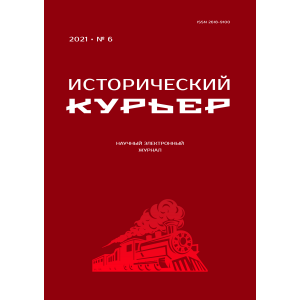The concept of “ideology”, which has never disappeared completely from historical toolkit, but which was for a long time perceived as a relic, today experiences renaissance both in scientific-historical narrative and in social practice. “Ideology Studies” are represented in this issue of our journal by a number of research areas, which is reflected in the structure of the issue.
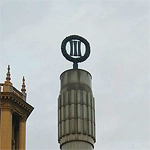 The Idea of Power
The Idea of Power
A.V. Korenevskiy
The Ideologeme of Deferred Demand, or How Many Times the Theory of “Moscow as the Third Rome” Was “Invented”?
The article examines the circumstances of emergence and subsequent history of the theory of “Moscow as the Third Rome”. The author aims to comprehend the causes of fluctuations in public interest in of this religious-political concept. He refers to the historiographical anamnesis of the concept of “invention” of the theory “Moscow as the Third Rome”. Verification of this interpretation is undertaken through a comprehensive analysis of sources that reflected the existence of the idea of the Third Rome in the 16th century.
Publishing: 28/12/2021
How to cite: Korenevskiy A.V. The Ideologeme of Deferred Demand, or How Many Times the Theory of “Moscow as the Third Rome” Was “Invented”? // Historical Courier, 2021, No. 6 (20), pp. 9–28. [Available online: http://istkurier.ru/data/2021/ISTKURIER-2021-6-01.pdf]
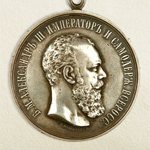 The Idea of Power
The Idea of Power
K.A. Semenchuk
Imperial Discourse and Metaphorical Models of the Russian Empire in the Church Periodicals of the Late 19th Century
The article deals with subjects related to the representation of state power in the church periodical press. It is shown that at the end of the 19th century, despite the appearance of publications tending to a mechanistic discourse, the political views of correspondents of church periodicals by their nature remained predominantly traditionalist and conservative with a focus on preserving the imperial political order.
Publishing: 28/12/2021
How to cite: Semenchuk K.A. Imperial Discourse and Metaphorical Models of the Russian Empire in the Church Periodicals of the Late 19th Century // Historical Courier, 2021, No. 6 (20), pp. 29–40. [Available online: http://istkurier.ru/data/2021/ISTKURIER-2021-6-02.pdf]
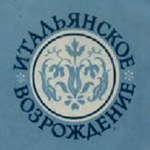 The Idea of Power
The Idea of Power
E.S. Kravtsova
The Bolshevik Power in Search of the Historic Legitimation: Creation the Soviet Concept of Renaissance
The article examines the stages of the formation Soviet concept of the Renaissance in the context of interaction of Bolsheviks and intellectuals in the USSR in the first half of the 20th century. The article, on the materials of publications edited during the second half the 1920s – first half the 1930s, shows how scientists from the academic environment adapted the Marxist method to their research and adjusted Burckhardt’s conception of the Renaissance as the period of discovery of man and the world in the ideology of cultural construction of socialism.
Publishing: 28/12/2021
How to cite: Kravtsova E.S. The Bolshevik Power in Search of the Historic Legitimation: Creation the Soviet Concept of Renaissance // Historical Courier, 2021, No. 6 (20), pp. 41–58. [Available online: http://istkurier.ru/data/2021/ISTKURIER-2021-6-03.pdf]
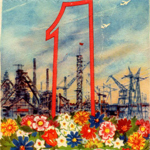 The Idea of Power
The Idea of Power
A.D. Popov, N.Yu. Pivovarov
Demonstration of Discursive Power: the Top Party Leadership of the USSR and Organizing the Celebration of May 1 and November 7 (1950–1960s)
The article analyzes the activities of the supreme political body of the USSR (Politburo/Presidium of the Central Committee of the Communist Party of the Soviet Union) to prepare for the two most important official holiday dates – the Holiday of International Solidarity of Workers (May 1) and the Anniversary of the Great October Socialist Revolution (November 7) in the 1950–1960s. The role of the top party leadership of the USSR in the preparation and conduct of the most important festive events is described (including a military parade and a mass demonstration of workers in Red Square in Moscow).
Funding: the research was funded by RFBR, project number 20-09-00218.
Publishing: 28/12/2021
How to cite: Popov A.D., Pivovarov N.Yu. Demonstration of Discursive Power: the Top Party Leadership of the USSR and Organizing the Celebration of May 1 and November 7 (1950–1960s) // Historical Courier, 2021, No. 6 (20), pp. 59–73. [Available online: http://istkurier.ru/data/2021/ISTKURIER-2021-04.pdf]
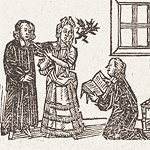 The Power of Ideas
The Power of Ideas
D.D. Krylova
The Power Over Demons as Political Authority: the Popular Pamphlet of Exorcism in a Ideological Discourse in Jacobean England
The article analyzes the role of the printed word and the image of exorcism, presented in the pages of popular pamphlets, in the ideological struggle of early Modern Age England. The author identifies the reasons for the use of the theme of possession and the ritual of exorcism in the confrontation between Catholics and Protestants, moderate Protestants and Puritans in England of the 16th–17th centuries.
Publishing: 28/12/2021
How to cite: Krylova D.D. The Power Over Demons as Political Authority: the Popular Pamphlet of Exorcism in a Ideological Discourse in Jacobean England // Historical Courier, 2021, No. 6 (20), pp. 74–87. [Available online: http://istkurier.ru/data/2021/ISTKURIER-2021-6-05.pdf]
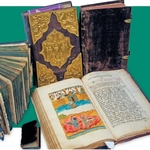 The Power of Ideas
The Power of Ideas
L.V. Titova
Publicistic Works of Old Believers as a Mechanism for the Transmission of Political and Moral Ideas (Based on the Materials of the Collection of Manuscripts of the Institute of History SB RAS)
In the article, based on the Collection of Handwritten and Old Printed Works of the Institute of History of the Siberian Branch of the Russian Academy of Science, the mechanism of transmission of Old Believer political and moral ideas to their like-minded people is considered. An appeal to the creative heritage of the defenders of traditional Russian Orthodoxy, its analysis and definition of its existence made it possible to conclude that the ideas embodied in their works were transmitted over three centuries not only to like-minded readers, but also to future generations in general.
Publishing: 28/12/2021
How to cite: Titova L.V. Publicistic Works of Old Believers as a Mechanism for the Transmission of Political and Moral Ideas (Based on the Materials of the Collection of Manuscripts of the Institute of History SB RAS) // Historical Courier, 2021, No. 6 (20), pp. 88–96. [Available online: http://istkurier.ru/data/2021/ISTKURIER-2021-6-06.pdf]
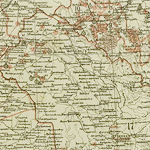 The Power of Ideas
The Power of Ideas
A.A. Tukhel
The Toponymical Transformation of the Verhnee Pritom’e in the Latter Half of 19th Century – the 1st Quarter of 20th Century: State and Ideological Influences
This article examines the influence of ethno-cultural processes on toponymy on the territory of the Upper Pritomye. The special influence of state-ideological influences on the transformation of the toponymic system existing in the studied region is revealed. Major infrastructure projects, agrarian and administrative reform, Stolypin agrarian reform and the state-controlled mass resettlement of peasants to Siberia, socialist transformations after 1917 became decisive factors in changing the toponymic system. The nature of interethnic relations between the alien, basically Russian-speaking, and the aboriginal population is analyzed on the basis of toponymic data.
Publishing: 28/12/2021
How to cite: Tukhel A.A. The Toponymical Transformation of the Verhnee Pritom’e in the Latter Half of 19th Century – the 1st Quarter of 20th Century: State and Ideological Influences // Historical Courier, 2021, No. 6 (20), pp. 97–104. [Available online: http://istkurier.ru/data/2021/ISTKURIER-2021-6-07.pdf]
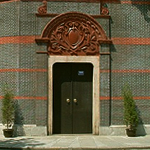 The Power of Ideas
The Power of Ideas
Yang Kuisun
The Influence of Soviet Russia on the Formation of the Communist Party of China
The article is devoted to the formation of the Communist Party of China with the support of Soviet Russia. After the Opium War of 1840, China was stuck in a semi-colonial state. To change the situation in the country, Chinese patriots tried to learn from the West, but before the October Revolution in Russia, the situation in China became even less stable. The unfair decisions of the 1919 Paris Peace Conference finally forced the progressive intelligentsia and students of China to turn their gaze to the revolutionary Russia oriented towards socialism. From July 23 to August 3, 1921, with the direct participation of representatives of the Comintern, the first congress of the Communist Party of China was held in Shanghai. The communist revolution in China has opened the curtain.
Publishing: 28/12/2021
How to cite: Yang Kuisun. The Influence of Soviet Russia on the Formation of the Communist Party of China // Historical Courier, 2021, No. 6 (20), pp. 105–110. [Available online: http://istkurier.ru/data/2021/ISTKURIER-2021-6-08.pdf]
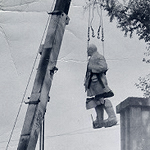 The Power of Ideas
The Power of Ideas
M.V. Gerasimov
The City Square as an Object of Ideological Transformation in the Post-Soviet Years: the Case of Tomsk
The article is devoted to consideration and analysis of the features of symbolic transformation of the public space of Tomsk in the post-Soviet years by the example of two city squares. The author describes the reaction of the city dwellers who used the space of the square to articulate oppositional narratives about the lost stability of everyday life in the form of political and commemorative actions. The conclusion is made about the ineffective use of the symbolic model of opposing the present to the “totalitarian” past in the process of building the power topography in the first post-Soviet years.
Publishing: 28/12/2021
How to cite: Gerasimov M.V. The City Square as an Object of Ideological Transformation in the Post-Soviet Years: the Case of Tomsk // Historical Courier, 2021, No. 6 (20), pp. 111–121. [Available online: http://istkurier.ru/data/2021/ISTKURIER-2021-6-09.pdf]
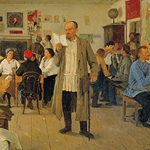 Ideocracy and Society
Ideocracy and Society
E.V. Metel
Teaching in the Early Years of Soviet Power: Ideological Transformation
The study describes the essence and significance of pedagogical congresses, as well as their role in the transformation of the position of teaching: from oppositional in December 1917 to loyal to the Soviet government in 1925. The purpose of the work was to study the mechanisms of local implementation of decisions taken by the First All-Union Teachers’ Congress. In particular, the measures taken in Biysk and the surrounding countryside were considered. In the course of the work, archival documents and published statistical data were analyzed.
Publishing: 28/12/2021
How to cite: Metel E.V. Teaching in the Early Years of Soviet Power: Ideological Transformation // Historical Courier, 2021, No. 6 (20), pp. 122–133. [Available online: http://istkurier.ru/data/2021/ISTKURIER-2021-6-10.pdf]
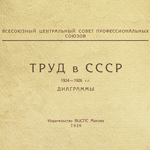 Ideocracy and Society
Ideocracy and Society
N.A. Potapova
Unemployment in the Soviet State in the 1920s: Ideological Doctrine and Economic Reality
The article analyzes the measures taken in the USSR in the fight against unemployment of the population, on the basis of which three stages of the state policy of destroying the “heritage of capitalism” can be distinguished. The author casts doubt on the conclusion that was fixed in Soviet historiography about the elimination of unemployment in the USSR and makes the assumption that unemployment after 1930 changed the form of its existence.
Publishing: 28/12/2021
How to cite: Potapova N.A. Unemployment in the Soviet State in the 1920s: Ideological Doctrine and Economic Reality // Historical Courier, 2021, No. 6 (20), pp. 134–141. [Available online: http://istkurier.ru/data/2021/ISTKURIER-2021-6-11.pdf]
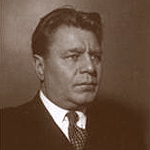 Ideocracy and Society
Ideocracy and Society
M.A. Semenov
Soviet Healthcare During the Great Patriotic War: the Transformation of Ideological Foundations
The article shows the peculiar features of formation and tupical charactiristies of the ideological foundations of Soviet healthcare in the pre-war years. The paper indicates dynamism and a high degree of adaptation to environmental conditions. It is noted that a sharp increase in the burden on health authorities, coinciding with a sharp weakening of their capabilities, made the adaptation of ideological principles of health care inevitable.
Acknowledgments: The reported study was funded by RFBR, project number 20-09-00397 “Civil health care of the rear areas of the USSR during the Great Patriotic War”.
Publishing: 28/12/2021
How to cite: Semenov M.A. Soviet Healthcare During the Great Patriotic War: the Transformation of Ideological Foundations // Historical Courier, 2021, No. 6 (20), pp. 142–148. [Available online: http://istkurier.ru/data/2021/ISTKURIER-2021-6-12.pdf]
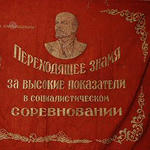 Ideocracy and Society
Ideocracy and Society
A.I. Savin, N.Yu. Pivivarov
“Two Plus Two Equals Five?”: Socialist Competition as an Ideological Concept in the Post-War USSR (1945–1964)
This article reconstructs the concept of socialist competition in the post-war period, that is, how the highest party and state leadership of the USSR understood in 1945–1964 the role and place of social competition in the Soviet economy and in the Soviet project as a whole, as well as how the forms and content of social competition were transformed in accordance with these ideas. A special place in the article is occupied by the issues of moral and material encouragement of participants of competitions and the deficiencies of social competition.
The study was carried out with the financial support of the RFBR in the framework of scientific project No. 20‑09-00218.
Publishing: 28/12/2021
How to cite: Savin A.I., Pivovarov N.Yu. “Two Plus Two Equals Five?”: Socialist Competition as an Ideological Concept in the Post-War USSR (1945–1964) // Historical Courier, 2021, No. 6 (20), pp. 149–169. [Available online: http://istkurier.ru/data/2021/ISTKURIER-2021-6-13.pdf]
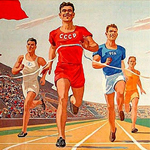 Ideocracy and Society
Ideocracy and Society
A.B. Kolesnikov
Physical Culture and Sport in the USSR as a Social “Laboratory” for Constructing the Ideal of a Soviet Person
The article is devoted to the aspects of the formation of the ideal of the Soviet man in the system of physical culture and sports of the USSR. The social functions of physical culture and sports of the 1950s and 1970s are studied in the context of the ideological project of the Soviet state. The characteristic of the process of political instrumentalization of physical culture and sports in the USSR is presented. The conclusion is made about the influence of the ideocratic regime on the construction of ideas about a new exemplary socialist personality.
Publishing: 28/12/2021
How to cite: Kolesnikov A.B. Physical Culture and Sport in the USSR as a Social “Laboratory” for Constructing the Ideal of a Soviet Person // Historical Courier, 2021, No. 6 (20), pp. 170–178. [Available online: http://istkurier.ru/data/2021/ISTKURIER-2021-6-14.pdf]
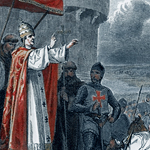 Historiographical Pages
Historiographical Pages
N.D. Nikolaevа
Experience of Understanding Political Cataclysms of the 12th Century: Aberrations of Historical Vision
The article is devoted to identifying the patterns and main features of the formation of historiography devoted to the relationship between the two Christian worlds in the 12th century, as well as to identifying the aberrations of historical vision generated by the idea of this century as a time of strengthening the prerequisites for a civilizational split. The author draws a number of conclusions about logical inconsistencies in research on the Christian East and West, their causes, and also suggests a way to solve these problems.
Funding: The research was funded by RFBR and Novosibirsk region, project number 19-39-90057.
Publishing: 28/12/2021
How to cite: Nikolaevа N.D. Experience of Understanding Political Cataclysms of the 12th Century: Aberrations of Historical Vision // Historical Courier, 2021, No. 6 (20), pp. 179–192. [Available online: http://istkurier.ru/data/2021/ISTKURIER-2021-6-15.pdf]
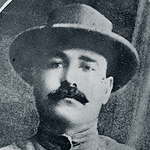 Historiographical Pages
Historiographical Pages
A.G. Teplyakov
Siberian Partisans of G.F. Rogov in Modern Historiography: Between Myth and Historical Criticism
The article is devoted to the problems of mythologization and demythologization of the activities of the anarchist partisans of the Siberian ataman G. Rogov in the Soviet and post-Soviet historiography. The Red partisans of the Civil War still remain the most mythologized participants in the Russian confrontation. If the shadow sides of the activities of the Soviet partisans of the Second World War are actively studied, then the rebels of the Civil War era usually still appear under an idealized guise of fighters against exploiters and interventionists.
The research was funded by RFBR and the Novosibirsk region, project number 20-49-540006.
Publishing: 28/12/2021
How to cite: Teplyakov A.G. Siberian Partisans of G.F. Rogov in Modern Historiography: Between Myth and Historical Criticism // Historical Courier, 2021, No. 6 (20), pp. 193–204. [Available online: http://istkurier.ru/data/2021/ISTKURIER-2021-6-16.pdf]
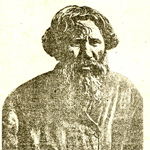 Open Archives
Open Archives
N.A. Starukhin
Minutes of the Regional Congress of Old Believers of All Agreements: on the History of Ideological and Organizational Processes in the Societies of Siberian Old Believers (Barnaul, July, 1917)
The article introduces into scientific circulation the protocols of one of the diocesan congresses of the Old Believers of the Belokrinitsky hierarchy, which took place in Barnaul from 20 to 24 July 1917. Its vivid feature was the inclusion in the agenda of issues of the country’s political life, so diligently camouflaged by the Old Believers’ organizations throughout their previous history. The attempts of the Old Believers of various accords to find common ground and to act as a united front on the eve of the upcoming elections to representative bodies of power also look very unusual.
Publishing: 28/12/2021
How to cite: Starukhin N.A. Minutes of the Regional Congress of Old Believers of All Agreements: on the History of Ideological and Organizational Processes in the Societies of Siberian Old Believers (Barnaul, July, 1917) // Historical Courier, 2021, No. 6 (20), pp. 205–223. [Available online: http://istkurier.ru/data/2021/ISTKURIER-2021-6-17.pdf]
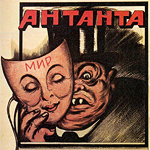 The Historian’s Workshop
The Historian’s Workshop
A.S. Vasilenko
History of Emotions as a Method of Study the History of the Civil War in Siberia
The article is devoted to consideration of concepts of the history of emotions and the potential for their inclusion in the study of the Civil War in Russia. Despite the fact that researchers have already attempted to study the emotional component of the conflict, thus far there are no works based on the conceptual and categorical apparatus of the history of emotions. the author is convinced that the history of emotion should contribute to a deeper understanding of historical processes and periods, and not become a separate discipline that replaces general history.
Publishing: 28/12/2021
How to cite: Vasilenko A.S. History of Emotions as a Method of Study the History of the Civil War in Siberia // Historical Courier, 2021, No. 6 (20), pp. 224–236. [Available online: http://istkurier.ru/data/2021/ISTKURIER-2021-6-18.pdf]



